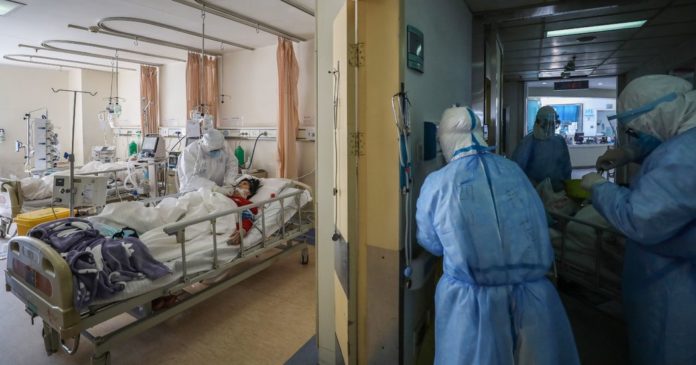(Want to get this briefing by email? Here’s the sign-up.)
Good morning.
We’re covering the growing repercussions of the coronavirus outbreak, the addition of Michael Bloomberg to this week’s Democratic debate, and a bankruptcy filing by the Boy Scouts of America.
Coronavirus is deadlier than flu, study finds
The fatality rate of the new coronavirus is far higher than that of the seasonal flu, according to a new analysis from the Chinese Center for Disease Control and Prevention.
The study found a fatality rate of 2.3 percent in China as of last week, though later figures suggest the rate has increased. In the U.S., flu fatality rates hover around 0.1 percent. Here are the latest updates and maps of where the virus has spread.
Yesterday: Americans flown home from a contaminated cruise ship in Japan said they were unaware until late that some evacuees were infected. “I didn’t know until we were in the air,” said Carol Montgomery. “I saw an area of plastic sheeting and tape.”
Closer look: Cambodia’s decision to let hundreds of passengers leave another cruise ship on which a person was infected could dramatically complicate the effort to contain the virus.
Another angle: HSBC, one of Hong Kong’s most important banks, said today that it would cut 35,000 jobs over the next three years, in part because of disruptions caused by the outbreak. On Monday, Apple cut its quarterly sales expectations and warned that the virus threatened global supply chains.
Related: The Tokyo Marathon, which planned to accept about 38,000 runners, will be restricted to about 200 elite participants. The race is scheduled for March 1.
Michael Bloomberg qualifies for debate
The former mayor of New York is set to appear for the first time at a Democratic presidential debate, based on a poll released this morning that showed him with the requisite support.
Mr. Bloomberg had failed to qualify for past debates in part because the Democratic National Committee had set a threshold for campaign contributions, which he is not accepting. The elimination of that requirement — a change criticized by Mr. Bloomberg’s rivals — allowed him to join Wednesday’s event in Las Vegas. Nevada’s caucuses are Saturday.
“The Daily”: Today’s episode is about Mr. Bloomberg’s history of political and charitable contributions.
Another angle: Elizabeth Warren’s supporters are convinced that her message is being ignored, but they say writing her off would be a mistake.
A ‘good war’ deteriorates, but talks go on
When the U.S. invaded Afghanistan in 2001 and toppled the Taliban’s government, much of Afghan society welcomed American troops.
After 18 years, that good will has long faded. Some Afghan soldiers have turned on their American partners, in so-called green-on-blue attacks. Two U.S. soldiers were killed this month in such an assault.
In September, President Trump called off peace talks with the Taliban after an attack that killed an American. This time, with an agreement near, few are talking about the continuing violence.
Yesterday: A Taliban spokesman confirmed that the insurgents had agreed to the terms of a deal and that the signing would happen this month.
Related: The gun used to kill Sgt. First Class Javier Gutierrez and Sgt. First Class Antonio Rodriguez on Feb. 8 was among hundreds of thousands of small arms that the U.S. government has issued to Afghan forces.
Another angle: President Ashraf Ghani was declared the winner of Afghanistan’s presidential vote today after months of delayed results.
Europe resists anti-Huawei campaign
The U.S. effort to prevent the use of the Chinese company’s equipment in the next generation of wireless networks has largely failed, as European leaders discount American warnings that Huawei represents a security threat.
The U.S. said it will stop sharing intelligence with any country that uses Huawei equipment, but Britain appears to be paying no price for its decision to let the company into parts of its network. Germany looks poised to follow suit.
What’s next: The Trump administration is attempting to cut off Huawei from American technology, but the company is still outcompeting its few rivals.
Quotable: “Many of us in Europe agree that there are significant dangers with Huawei, and the U.S. for at least a year has been telling us, do not use Huawei. Are you offering an alternative?” said Toomas Hendrik Ilves, Estonia’s former president. “What is it that we should do other than not use Huawei?”
If you have 6 minutes, this is worth it
Young Somalis step up
Three decades of crises have left Somalia’s government incapable of providing even basic services. So young Somalis have sprung into action as volunteer medics, road-builders, educators and more.
After a deadly truck bombing in Mogadishu in December, volunteers including Dr. Amina Abdulkadir Isack, above right, tracked the victims, called their families and collected donations. “It showed us we could do something to save lives,” she said.
Here’s what else is happening
Bankruptcy filing for Boy Scouts: Facing a surge of legal costs over its handling of sexual abuse allegations, the Boy Scouts of America filed for bankruptcy protection today. It was unclear how the process would affect the 110-year-old organization, which has 2.2 million participants.
Smaller-than-expected opioid payout: Amid talks to settle thousands of opioid-related lawsuits nationwide, lawyers say the pharmaceutical industry is likely to pay far less compensation than envisioned.
Snapshot: Above, County Road JJ outside Arcadia, Wis., where a school bus slid off the road last fall. Throughout much of the Midwest and South, the rural transportation system is crumbling, and as supersize vehicles bear heavier loads, maintenance budgets can’t keep up.
What we’re reading: This collection of letters to The Guardian. “British newspapers’ letters pages are a peculiar sort of joy,” writes Peter Robins, an editor in our London newsroom. “Recently, readers of The Guardian have been debating how old you have to be before it’s eccentric to keep boiling up your annual 18-pound batch of homemade marmalade. Bidding started at 77 and has escalated rapidly.”
Now, a break from the news
Watch: Zoë Kravitz has her first lead role, in the Hulu series “High Fidelity.” She spoke to The Times about her acting and her life.
Read: “Apeirogon,” the latest novel from Colum McCann, examines the Israeli-Palestinian conflict through the eyes of two grieving fathers.
Smarter Living: Experts say the best way to form healthy habits is to tie them into existing patterns. Here’s more advice. (You can get the same tips delivered each day on Alexa smart speakers.)
And now for the Back Story on …
Somalia’s future
Abdi Latif Dahir is The Times’s East Africa correspondent. A Kenyan of Somali descent, he reports in and about several countries. We reached him in Nairobi, Kenya, to talk about his article mentioned above, about young Somalis.
This is such a powerful story of resilience and hope. How did you find it?
Late last year, there was a big attack in Mogadishu, the worst by Al Shabab in two years. And one thing stood out. Almost all the news stories mentioned that a lot of students had died, young people who wanted to be doctors or were studying other specialties that would help the country.
On Jan. 1, I flew to Mogadishu, to follow up on the attack and to write about these students and what they mean to Somalia.
My first story was about that, but also on how things had been getting so much better in Mogadishu — and it was all these young people doing it.
What else inspired you?
I went to this crisis center. They were collecting the names of the victims and reaching out to their families. I wanted to sit among them and see what it was like. They were checking in, asking the families, how are you today?
And maybe they’d hear that the hospital bill had been paid so that was OK, but the family hadn’t eaten breakfast that day. So they would corral someone to get food over to them.
I wanted to write about the chutzpah to invent these systems, to stay strong with all that was happening.
People could rattle off all these names of people they’ve known who’ve been killed. But then they would say, we want to stay here and be the ones to fix this country. They’re creating tech hubs, and restaurants and delivery services that are thriving. Because of the attacks on hotels and restaurants, it’s safer to stay home, have friends over and order a meal.
How is it being the East Africa correspondent?
I’ve had the job since November. It’s incredible. This is a dynamic, evolving region that’s changing socially, geopolitically, economically. It’s a great place to be a journalist. Honestly, you could write a story every hour.
That’s it for this briefing. See you next time.
— Chris
Thank you
Mark Josephson and Eleanor Stanford provided the break from the news. You can reach the team at briefing@nytimes.com.
P.S.
• We’re listening to “The Daily.” Today’s episode is about Michael Bloomberg.
• Here’s today’s Mini Crossword, and a clue: Sound made with two fingers (four letters). You can find all our puzzles here.
• Members of our Visual Investigations team recently answered reader questions on YouTube about their reporting techniques, how they choose stories and more.
Source : Nytimes









